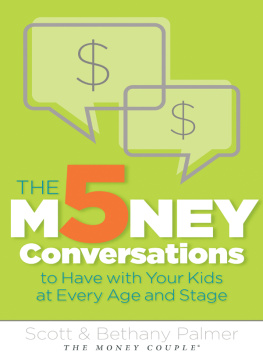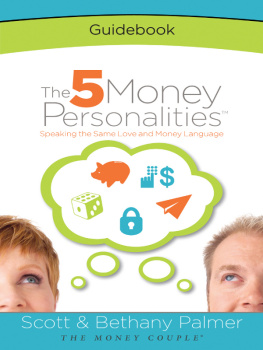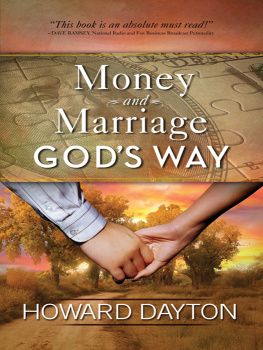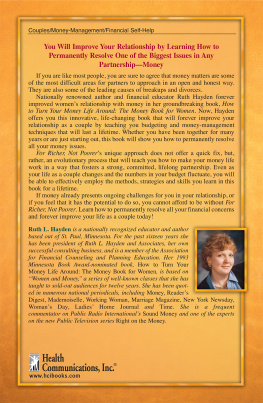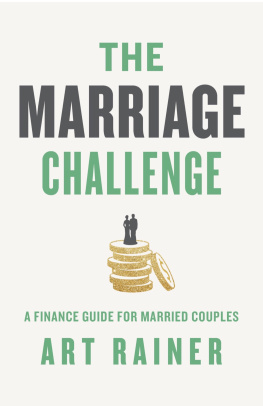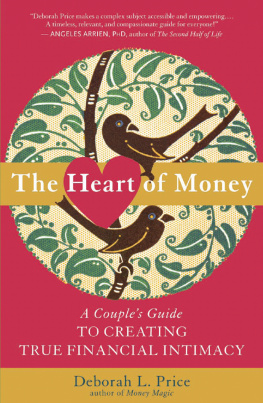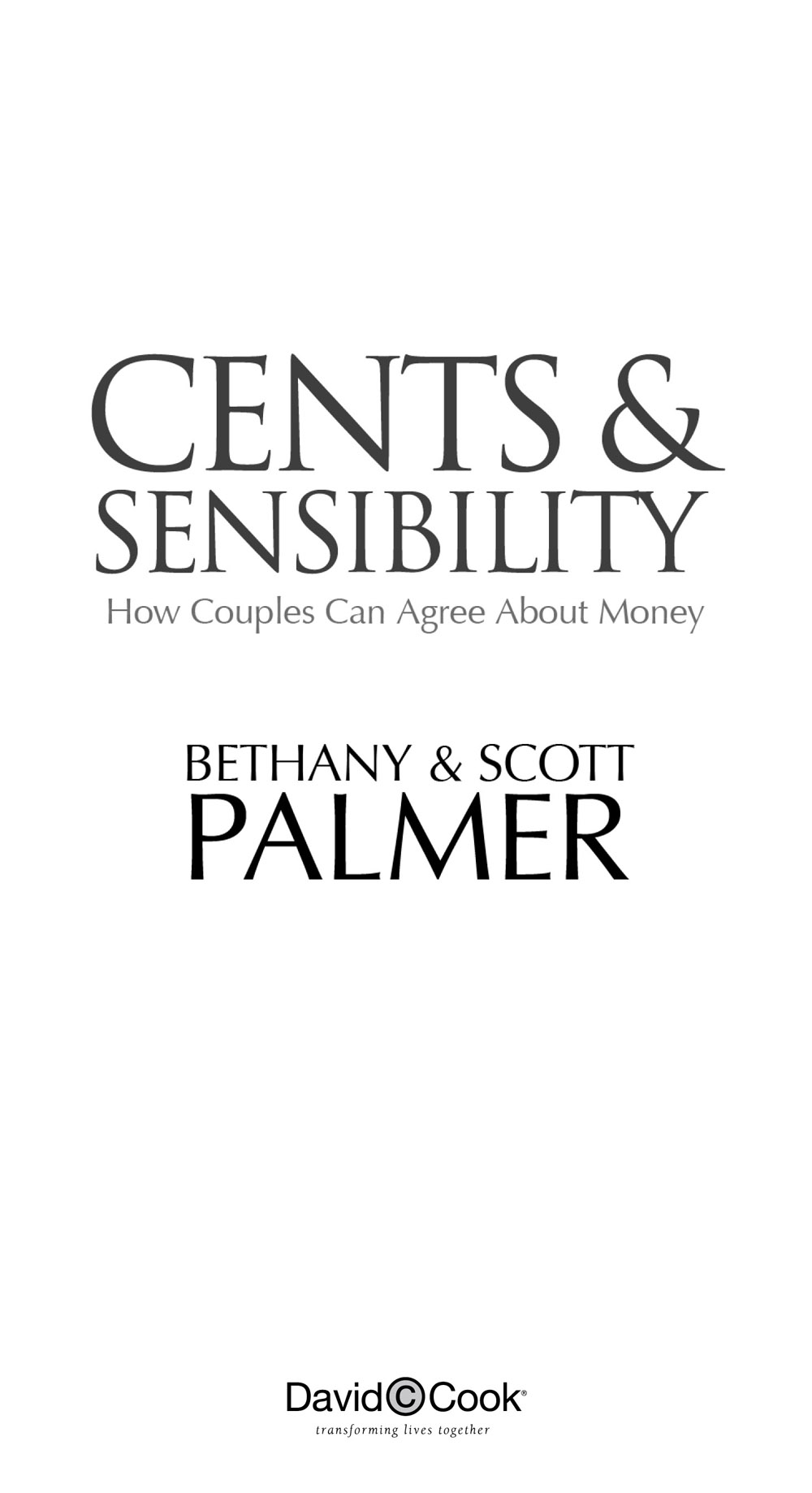Thank you for your unyielding support and prayers.
We would like to thank the many people who made this book possible and helped make our dream come true.
Thank you to our wonderful staff at Envoy Financial for your support. Other professionals we would like to thank include Keith Wall, Mary McNeil, Dan Benson, Sarano Kelley, and Jackie Johnson.
We also want to thank our fathers for introducing us to the financial industry. Without your knowledge and guidance, this book would have never been possible.
Next we want to thank Grams, Brent, Steve, TL, Dean, Cher, Shelly, Chris, Amy, Sandy, Bruce, Val, Larry, Tom, Deb, Ann, Jim, and Bob.
Finally, we want to thank our boys, Cole and Cade, for all the joy you bring to our lives.
Introduction
The Clash over Cash

How You and Your Partner Approach Money
Can Cause Your Relationship to Sink or Soar
W hen we began telling friends, clients, and acquaintances that we were writing a book on how couples can agree about money, we nearly always received one of two responses. Some people would tell us, Hurry up and get it done. My wife and I need helplots of helpin that area. Others would say, Oh, you can interview my husband and me for your book. Then they would quickly add, Were a perfect example of what not to do when it comes to dealing with money in marriage.
What we almost never heard was this: A book about financial compatibility in relationships? Nah, we dont need it. Thats not a problem for us.
Its true. The vast majority of coupleseven Christian couplesstruggle to some degree with money management, budgeting, debt, investments, and everything else related to finances. Indeed, issues surrounding money are one of the primary reasons couples argue. This is not merely conjecturenumerous research studies show that money and marriage are often a toxic blend. For example, Drs. Scott Stanley and Howard Markman, two of the nations leading researchers on relationship issues, conducted a large-scale study to determine what causes couples the most trouble. Their finding? Money is the number one issue people say they argue about most in marriage.
We could fill pages with similar research findings, but chances are you dont need to be convinced. You know that for most couples, money is a contentious subject. Sometimes the disagreements are relatively mild, generating tension rather than tantrums, tussles rather than tirades. For many other couples, however, financial disputes represent a major issue that causes ongoing strain, division, and heated arguments.
If left unaddressed, money conflicts can undermine the foundation of a marriage. Sometimes what begins as a little wrangling about saving and spending can lead to all-out warfare, with disastrous consequences. One study found that 56 percent of all divorces are a result of financial tension in the home.
Why is money so often at the heart of relationship conflict? Because spouses frequently approach financial matters differentlysometimes extremely differently. In many cases, one spouse is a saver, while the other is a spender. Or it might be that one partner is a risk-taker, while the other is a security-seeker. Other times, one person will get exceedingly stressed about mounting debt, while his or her partner shrugs it off as no big deal.
All of us develop a money personalitya framework or context from which we approach finances. And many influences shape this personality: family background, spiritual beliefs, past experiences, and so on. For instance, if you grew up in an affluent family and married someone from a poor family, youre bound to run into money-management differences. If you derive great satisfaction from giving lots of money to your church or favorite charity, while your partner obsessively squirrels away funds in IRAs and 401(k)s, some sparks are going to fly in your relationship.
No doubt about it, differing behaviors and beliefs about finances create conflicts and clashes. At the intersection of marriage and money, lots of nasty collisions occur. Olivia Mellan, a psychotherapist specializing in financial issues, said,
Most people relate to money much as they relate to another personin an ongoing and complex way that taps deep-seated emotions. When two individuals form an enduring relationship with each other, money is always a partner, too. Many individuals have a troubled relationship with money. Then, when they get into a couple relationship, money matters get explosive. Other people may have no problem with money individually; the trouble starts after theyre in a relationship.
I have observed that couples usually polarize around money. Partners tend to assume defensive styles, or personalities, in relation to money that are direct opposites of each other.
We couldnt agree more. In our work as financial professionals over the past fifteen years, we have counseled scores of couples for whom financial disagreements undermined the quality of their relationshipsand the quality of their lives. We have listened to countless stories of shattered lives and broken families. Some managed to resolve their differences and restore their relationships; many did not.
If you are currently married or planning to get married sometime soon, you dont want to let money be a constant source of stress and strife in your relationship. Whether you and your partner collide because of differing money personalities or other issues, you want things to be better. Youre tired of the tension and frustration. Youve tried to talk about it (or tried not to talk about it), but whatever youve done has not worked. You dont want to fight, and you certainly dont want to be another statistica couple that separated or divorced because they couldnt resolve problems.
Just as couples have diverse perspectives about saving, spending, and planning for the future, they also have different styles of communication, problem solving, and conflict resolution. How do you handle things when you disagree? Do you argue or withdraw? Do you insist on hammering home your point, or do you erect an emotional wall of silence? Misunderstandings and miscommunication inevitably lead to arguing, blaming, or distancing.
Its time for change. Cents and Sensibility is a relational guidebook designed to help married and engaged couples build (or rebuild) their relationship by working together on financial issues. With sound principles, open-mindedness, and a clear-eyed perspective, you and your partner can make radical changes for the better. By learning to understand your spouse, respect each other, and communicate more effectively, you can begin your journey toward healing and happiness.
Heres a big bonus: weve learned that when couples agree on moneywhen they accept differences, stop blaming each other, and establish mutual goalsthey usually move rapidly toward financial success. Two partners who link arms and cheer each other on take giant strides toward their goals and dreams. Of course, the reverse is also true. People working at cross-purposes encounter one roadblock after another. They expend so much energy hassling and haranguing each other that they undermine whatever financial goals they might have.



